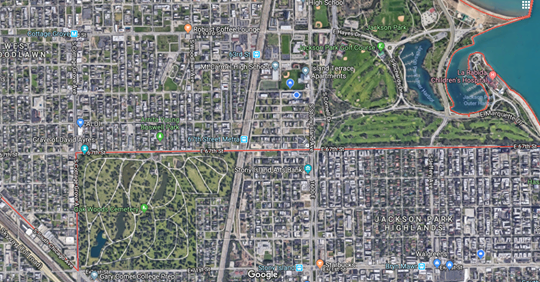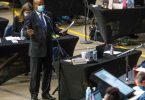A couple of weeks ago, in a bid to appear proactive after 20 years of inaction, Fifth Ward Alderman Leslie Hairston announced a plan to borrow our way out of economic malaise in a struggling portion of the Fifth Ward. As detailed in an article in the Hyde Park Herald, Hairston says she will somehow get a bond issued for a portion of the ward and spend the money on local groups to revitalize the economy. It’s the sort of plan that leaves you somewhat relieved when you determine that it is not real, but then you get angry all over again when you realize a serious issue is being treated like a political football.
Other parts, equally in need, will be ignored: It is a plan just for South Shore. She thinks, apparently, that Woodlawn and Grand Crossing’s roughly 5,000 registered voters don’t support her enough to count. I already responded to the plan in a letter to the editor. It has a multitude of problems, beginning with the likelihood that it is an empty campaign promise, but it is worth revisiting in brief once more, if only to emphasize where we really need to be focused.
This idea of the city borrowing money that then is given to community organizations that will somehow remake a struggling neighborhood is sadly both misinformed and part of an increasingly common theme. Aldermen are inclined to chase outside money and promise it will magically change neighborhoods. Outsiders use this tendency to buy up neighborhoods and exacerbate the crisis of dwindling local assets. When the neighborhood doesn’t change, it, and its residents, are blamed: People who don’t even live here are trying to help, the argument goes, and you still don’t maintain the neighborhood.
I have talked about the problems with this “predatory investing” and the horrible victim-blaming narrative that goes with it elsewhere, but my focus here is less on the dangers of the approach than on the simple fact that they mis-identify the heart of the problem. We are not helpless paupers and therefore in need of charity. We are robbed and are in need of restoration of the assets taken from us.
If I had more time, I would chart the American tradition of stealing from the African American community which predates the founding of the country, but it is election season, and I must be brief. (Also, there are many local intellectuals who have written eloquently on this and related subjects and the information is readily available if one simply asks around at local spots such as Chef Sara’s or BUFI or even, on certain days, the South Shore Cultural Center. People are just walking around the community with vast knowledge and insight about this and other topics.) I will simply assert that anyone with a working understanding of American history generally and Black history in this country in particular knows that schemes to strip assets away from African Americans are central to the economic system. One must deliberately and consciously fight back against this trend in order to legitimately seek economic and social justice.
In the Fifth Ward, this is best achieved through a two-fold focus on local employment and local asset redistribution. The latter goes more directly to the heart of the matter. It is less radical than it sounds. Within the Fifth Ward, thousands of units of housing have been swallowed up by the predatory mortgage scandal that swept the country in the aughts and especially devastated African American communities. Homes numbering in the hundreds that include these foreclosed buildings, vacant land, and other properties owned by outside interests who do not seem willing to put them to productive use represent, as an aggregate, a portfolio that must be dedicated to rebuilding local individual and family assets.
This can be a simple, practical, and revitalizing process. It requires a local financial institution to provide financial advisors to residents who acquire such properties. I am interested in developing a branch of the South Side Community Federal Credit Union, of which I am a founding organizer, as that partner on 71st Street. Other institutions could serve, but other founders and the head of the credit union are in accord about both the idea and the pressing need I describe and its remedy. This is a commitment I bring to South Shore and the South Lakefront through my campaign.
Local employment follows directly after the effort toward redistribution of derelict or unproductive properties. An accompanying project would provide small grants to entrepreneurs willing to open up shop in one of the many, many vacant storefronts on 71st Street and ensure employment and activation of storefronts. It will also identify property owners who stubbornly resist putting their property to productive use. There is, in my view, no justification to the property owner who would ruin a commercial block and jeopardize revitalization of the street for the sake of easy money or through indifference. These owners must change their ways or sell their properties. No one has the right to harm a whole community for their own gain.
With a local financial institution as a partner in this endeavor, assets could be managed with the expert advice of the professionals working there. Newly employed people could open accounts. New businesses could likewise concentrate their capital locally. The lives of individuals and families will be impacted immediately. And from all of this, over the course of a generation of careful stewardship, one will begin to see progress.
This is the sort of vision that will actually go someplace, but instead we get vague assurances and false promises that we can borrow our way out of trouble. The people of our communities are clear-eyed and not easily fooled. We know where we stand, we know shortcuts will do us no good, and we are ready for a real vision. Moving this forward will require a genuine local political partner. I promise to be that partner, and I promise you will never hear false claims about how other people buying up the equity and assets in our community is somehow “saving” us. That saves one type of person: the do-nothing politician. And that, honestly, is not someone we need to put forth any effort to save.







